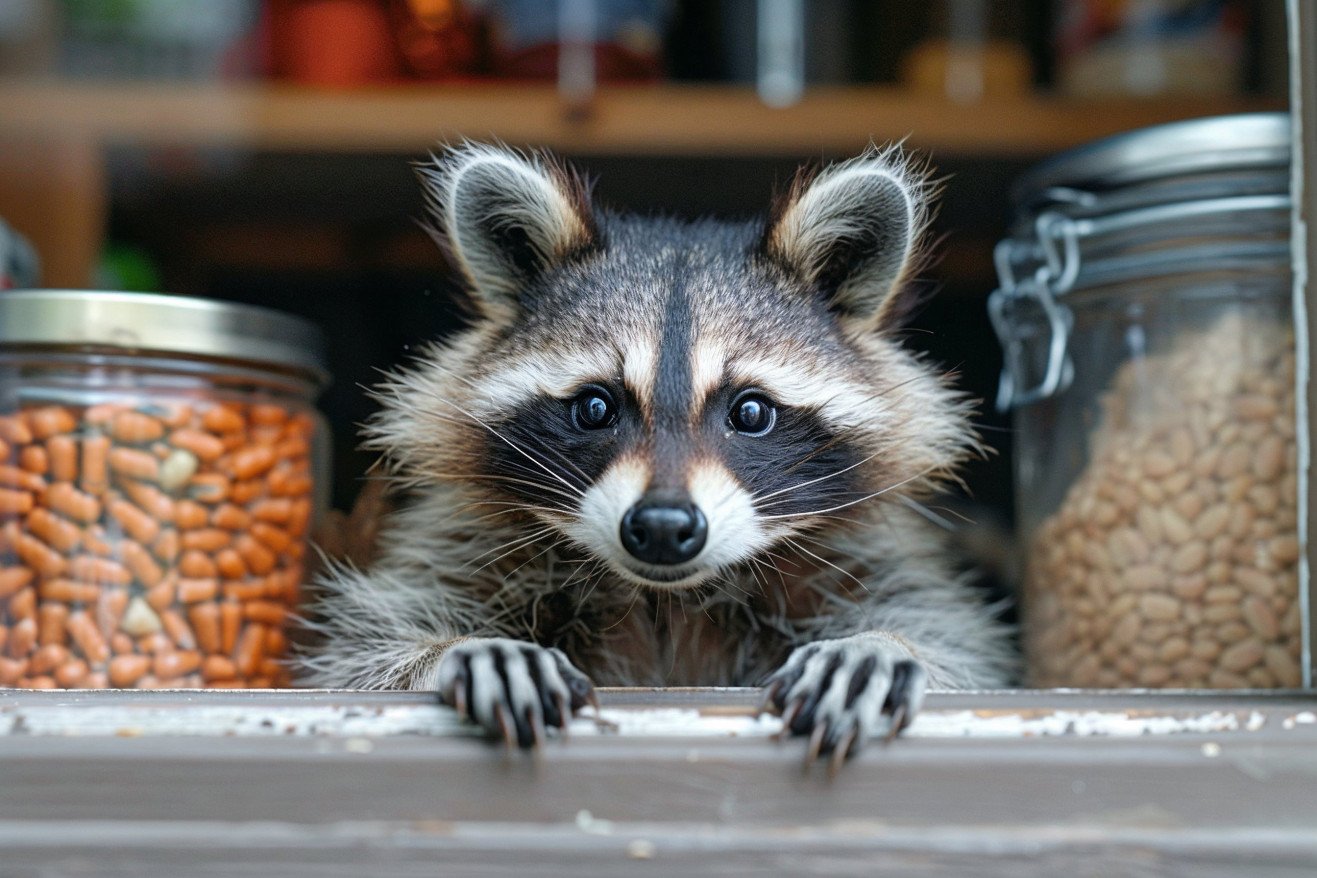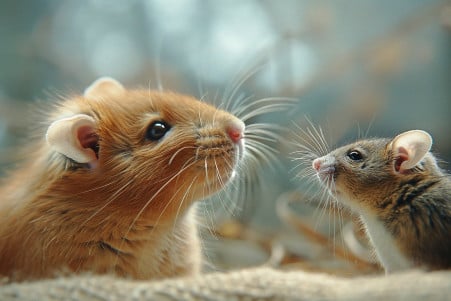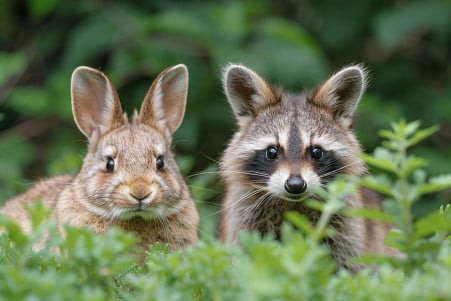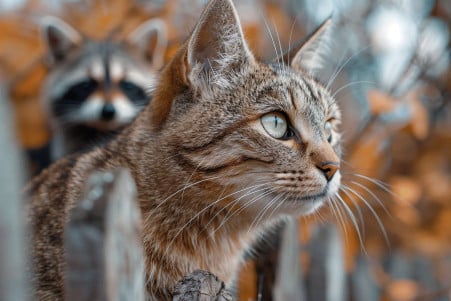What Do Raccoons Eat? A Look at Their Hunting Behavior
8 May 2024 • Updated 6 May 2024

If you've ever watched a raccoon rummage through your garbage, you might have wondered if they would eat rats or other rodents. The truth is that raccoons are opportunistic omnivores that will eat a wide variety of foods, including rats, mice, squirrels, and other small mammals, although their diet is primarily made up of plant foods.
In other words, while raccoons aren't exactly the bane of the rat world, they won't say no to a rodent meal if it's offered to them. In this article, we'll take a look at the most recent studies by wildlife biologists and animal behaviorists that have investigated the hunting behavior and dietary choices of raccoons. This research shows that the relationship between raccoons and rodents is more complex than you might think, and that it's influenced by a number of factors, including when and why raccoons choose to hunt for food, as well as the availability of their food sources.
Do raccoons eat rats?
How Raccoons Hunt Rats and Mice
Raccoons are skilled hunters and will wait for the right moment to pounce on their rodent prey, according to Wildlife Animal Control. They will often hide on top of tree branches and wait for the perfect moment to catch a mouse or rat. After they catch their prey, raccoons will usually take them to a more secluded area to eat where they won't have to worry about other animals or people disturbing them.
Outdoor rats that are drawn to pet food or garbage are especially susceptible to raccoon predation, as they are easy to catch when they are lured out into the open. However, rats and mice are intelligent animals with a strong sense of smell that often helps them detect the presence of a raccoon predator, which can help them get away and return to their nests.
While raccoons will hunt rats and mice when the opportunity arises, only the smartest, most experienced raccoons are able to consistently catch these intelligent, elusive prey animals. Their hunting strategy requires patience, stealth, and the ability to ambush rats and mice that are often able to detect danger and escape to safety. This demonstrates the complex predator-prey relationship between raccoons and rodents in both urban and natural settings.
Disease Risks Associated With Raccoon-Rodent Interactions
One of the most well-documented examples of the potential disease risks associated with raccoon-rodent interactions is the transmission of the raccoon roundworm, Baylisascaris procyonis. According to the CDC, this roundworm can cause severe disease in humans and other animals if left untreated. While raccoons are the primary host for this parasite, rats and mice can also help spread the eggs that cause the infection through their feces after they eat them.
In fact, studies have shown that introduced rat species, such as the black rat (Rattus rattus), may be particularly important in the transmission of the Baylisascaris roundworm in some environments. One PubMed study found that black rats were infected at intensities more than 100 times that of native rodent species, and that their carcasses were frequently scavenged by raccoons and other predators.
In addition, raccoon latrines, where raccoons defecate, can lead to the spread of roundworm eggs and subsequent contamination of the environment, which can put children at particular risk. While human cases are rare, the CDC reports that some cases may go undiagnosed due to a lack of awareness. Proper sanitation and the prevention of raccoon-rodent-human interactions are important for reducing these disease risks.
Ecological Roles of Raccoons and Rodents
Raccoons are opportunistic omnivores that are important in controlling animal populations through predation, according to the Washington Department of Fish & Wildlife. Raccoons also help disperse seeds and improve soil aeration through their scavenging activities, according to the Learning Portal.
Rodents such as rats and mice are important prey for many predators and help keep the food web in check, according to Natran Green Pest Control. Raccoons and rodents also both help with seed dispersal, which is important for plant growth and biodiversity. In a twist, Skedaddle Wildlife observes that raccoons are also a food source for larger carnivores, showing how they fit into the ecosystem's food chain.
Coexisting With Raccoons and Rodents in Urban Areas
Raccoons and rodents may be in direct competition for food waste and other resources in urban and suburban areas, according to information from Backyard Chickens. Measures like securing trash cans, not leaving pet food outside, and sealing entry points can help keep both raccoons and rodents away, as pointed out by Smith's Pest Management.
Exclusion, live trapping, and habitat modification are humane wildlife control methods that can be used to address these concerns, according to Smith's Pest Management. However, raccoons can only be relocated with a permit and this method often isn't effective in the long term, according to the Forest Preserve District of Will County.
A more balanced approach seeks to coexist with wildlife while minimizing risks to human health and safety and property damage, according to Smith's Pest Management. This means learning about wildlife habits, taking steps to prevent problems, and using non-lethal methods to control raccoon and rodent populations in a way that's ethical.
Conclusion: Balancing Act in Urban Ecosystems
Raccoons and rodents are both important parts of urban and natural ecosystems. Although raccoons will prey on rodents when the opportunity arises, the relationship between the two species is multifaceted and not always straightforward. Raccoons are omnivores that eat a wide variety of foods, including plants, insects, small animals, and human food waste. They are skilled stalkers that will patiently watch for rodent prey before quietly approaching.
The raccoon roundworm (Baylisascaris procyonis) is a serious concern, as it can infect humans and other animals, causing severe illness if untreated. Raccoons are the primary host, but rats and mice can also spread the infectious eggs. Maintaining proper sanitation and preventing interactions between raccoons, rodents, and humans is crucial to mitigate these disease risks.
Raccoons help control animal populations through predation, and as scavengers they help disperse seeds and improve soil aeration. Rodents like rats and mice are important prey for many predators, helping maintain balance in the food web. Both raccoons and rodents contribute to seed dispersal, which aids plant growth and biodiversity.
In urban and suburban areas, raccoons and rodents may compete for resources like food waste and shelter. Humane wildlife control methods like exclusion, live trapping, and habitat modification can effectively address these issues. A balanced approach aims to coexist with wildlife while mitigating health and property risks, through understanding wildlife behavior and needs.


